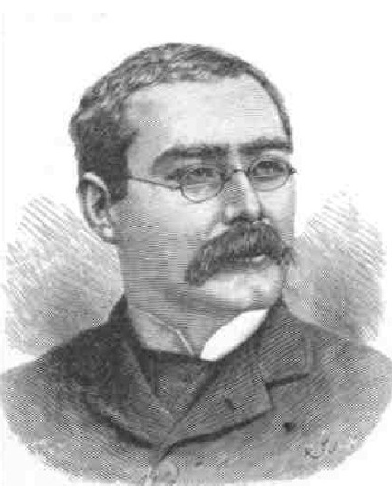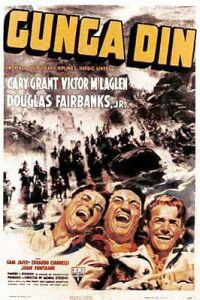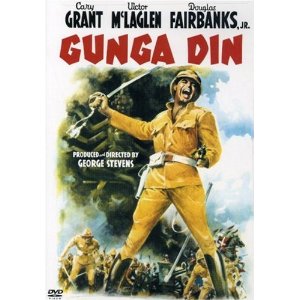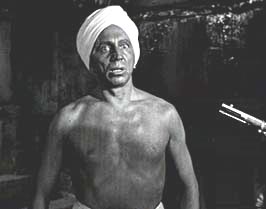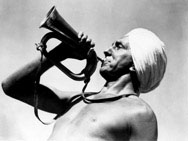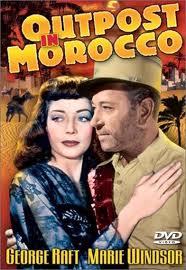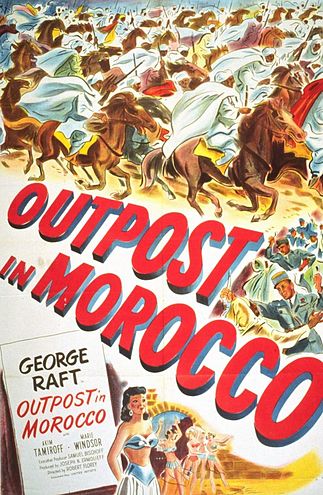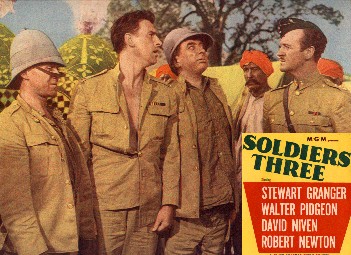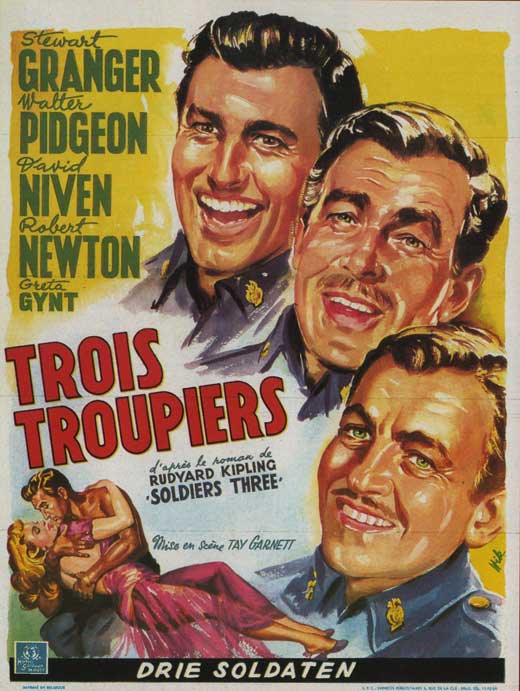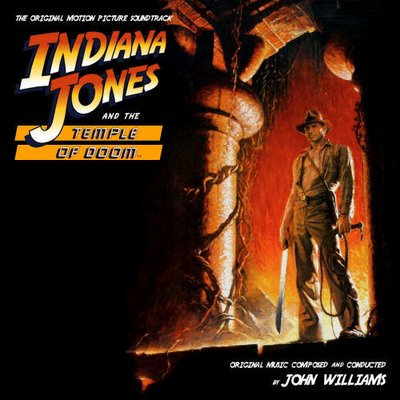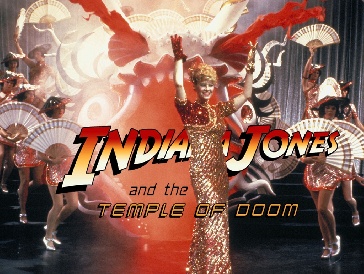|
|
Online Poems for Craig White's Literature Courses |
|
|
"Gunga Din" (1892) by Rudyard Kipling 1865-1936
YouTube spoken performance of poem "Gunga Din" (In Hindi, "Gunga Din" means "spirit of the Ganges";
see below for 1939 film |
|
Instructor's note: The poem's speaker, whose style and references indicate Cockney dialect and working-class origins, is an English veteran of colonial service in India.
Stylistically, the poem demonstrates Kipling's clever mimesis or imitation of another's voice and worldview.
The poem's content conforms to Kipling's enigmatic position as a colonial writer.
-
As the author of "The White Man's Burden" and other imperialistic verse, his attitudes toward the colonized or native peoples often appears stereotyped and patronizing.
-
Kipling's vitality and mimesis often exceed such limitations. For instance, the working-class British soldier-speaker admires Din's courage and service, and imagines sharing the afterlife with him.
![]()
GUNGA DIN
You may talk o' gin and beer
When you're quartered safe out 'ere,
[out 'ere = India, the colonies]
An' you're sent to penny-fights an' Aldershot it;
[penny-fights = inexpensive boxing matches > military
skirmishes; Aldershot = Victorian town, "home of the British Army"]
But when it comes to slaughter
You will do your work on water,
[i.e., warriors in combat need constant supplies of water]
An' you'll lick the bloomin' boots of 'im that's got it.
[it = water]
Now in Injia's sunny clime,
Where I used to spend my time
A-servin' of 'Er Majesty the Queen,
Of all them blackfaced crew
[them blackfaced crew = native water-bearers]
The finest man I knew
Was our regimental bhisti, Gunga Din.
[bhisti, bheesti=
Indian servant who supplies an establishment with water, which he carries in a
skin slung on his back.]
He was "Din! Din! Din!
You limpin' lump o' brick-dust, Gunga Din!
Hi! slippery hitherao!
Water, get it! Panee lao! [Bring water swiftly.]
You squidgy-nosed old idol, Gunga Din."
The uniform 'e wore
Was nothin' much before,
[before = in front]
An' rather less than 'arf o' that be'ind,
['arf = half; be'ind = behind, in back]
For a piece o' twisty rag
[twisty rag = loincloth]
An' a goatskin water-bag
Was all the field-equipment 'e could find.
When the sweatin' troop-train lay
In a sidin' through the day,
Where the 'eat would make your bloomin' eyebrows crawl,
We shouted "Harry By!"
["O brother."]
Till our throats were bricky-dry,
Then we wopped 'im 'cause 'e couldn't serve us all.
It was "Din! Din! Din!
You 'eathen, where the mischief 'ave you been?
You put some
juldee in it [hurry]
Or I'll
marrow you this minute
[strike]
If you don't fill up my helmet, Gunga Din!"
'E would dot an' carry one
[elementary arithmetic]
Till the longest day was done;
An' 'e didn't seem to know the use o' fear.
If we charged or broke or cut,
[we = soldiers]
You could bet your bloomin' nut,
[nut = worth, holdings, stakes, savings]
'E'd be waitin' fifty paces right flank rear.
With 'is mussick on 'is back, [Water-bag]
'E would skip with our attack,
[skip with = keep up with]
An' watch us till the bugles made "Retire."
["Retire" = withdraw, stop fighting]
An' for all 'is dirty 'ide
['is dirty 'ide = his dirty hide]
'E was white, clear white, inside
When 'e went to tend the wounded under fire!
It was "Din! Din! Din!"
With the bullets kickin' dust-spots on the green.
When the cartridges ran out,
You could hear the front-files shout,
"Hi! ammunition-mules an' Gunga Din!"
I shan't forgit the night
When I dropped be'ind the fight
With a bullet where my belt-plate should 'a' been.
I was chokin' mad with thirst,
An' the man that spied me first
Was our good old grinnin', gruntin' Gunga Din.
'E lifted up my 'ead,
An' he plugged me where I bled,
An' 'e guv me 'arf-a-pint o' water-green:
It was crawlin' and it stunk,
[crawlin' = alive with vermin]
But of all the drinks I've drunk,
I'm gratefullest to one from Gunga Din.
It was "Din! Din! Din!
'Ere's a beggar with a bullet through 'is spleen;
'E's chawin' up the ground,
An' 'e's kickin' all around:
For Gawd's sake git the water, Gunga Din!"
'E carried me away
To where a dooli lay,
[dooli, doolie, dooly = simple litter or palanquin to
serve as man-carried army ambulance]
An' a bullet come an' drilled the beggar clean.
'E put me safe inside,
An' just before 'e died,
"I 'ope you liked your drink," sez Gunga Din.
So I'll meet 'im later on
At the place where 'e is gone—
[the speaker declares both him Din hell-bound for the
afterlife, but treated humorously]
Where it's always double drill and no canteen;
'E'll be squattin' on the coals
Givin' drink to poor damned souls,
An' I'll get a swig in hell from Gunga Din!
Yes, Din! Din! Din!
You Lazarushian-leather Gunga Din!
[Lazarushian = leprous, w/ play on
Gospel of Luke, 16: 19-31]
Though I've belted you and flayed you,
By the livin' Gawd that made you,
You're a better man than I am, Gunga Din!
![]()
totally great Byrds tune from 1969 by Gene Parsons titled "Gunga Din" (little reference to Kipling or movie; mostly psychedelic)
http://www.youtube.com/watch?v=DQND8VwGQT4
![]()
The film called Gunga Din
|
|
|
Gunga Din is a swashbuckling, rollicking adventure film from 1939 set in colonial India. Its three central male leads (including Cary Grant) are soldiers of the British Empire. Gunga Din, their native water-bearer, is played by character actor Sam Jaffe. The film is directed by George Stevens, famous for successful mid-20c films including Shane (1953), A Place in the Sun (1951), Giant (1956), and The Diary of Anne Frank (1959).
The film concerns a murderous Indian cult of "Thuggees" (source of English "thugs").
Many scenes and plot devices from Gunga Din concerning the Thuggees reappeared in the second Indiana Jones film, Indiana Jones and the Temple of Doom (1984).
YouTube theatrical trailer for Gunga Din
scene at Thuggee temple
http://www.youtube.com/watch?v=fm_N4pmcRx8
Sam Jaffe as water-bearer Gunga Din
|
|
|
Indiana Jones & the Temple of Doom trailer
http://www.youtube.com/watch?v=HOwWfns4qqw
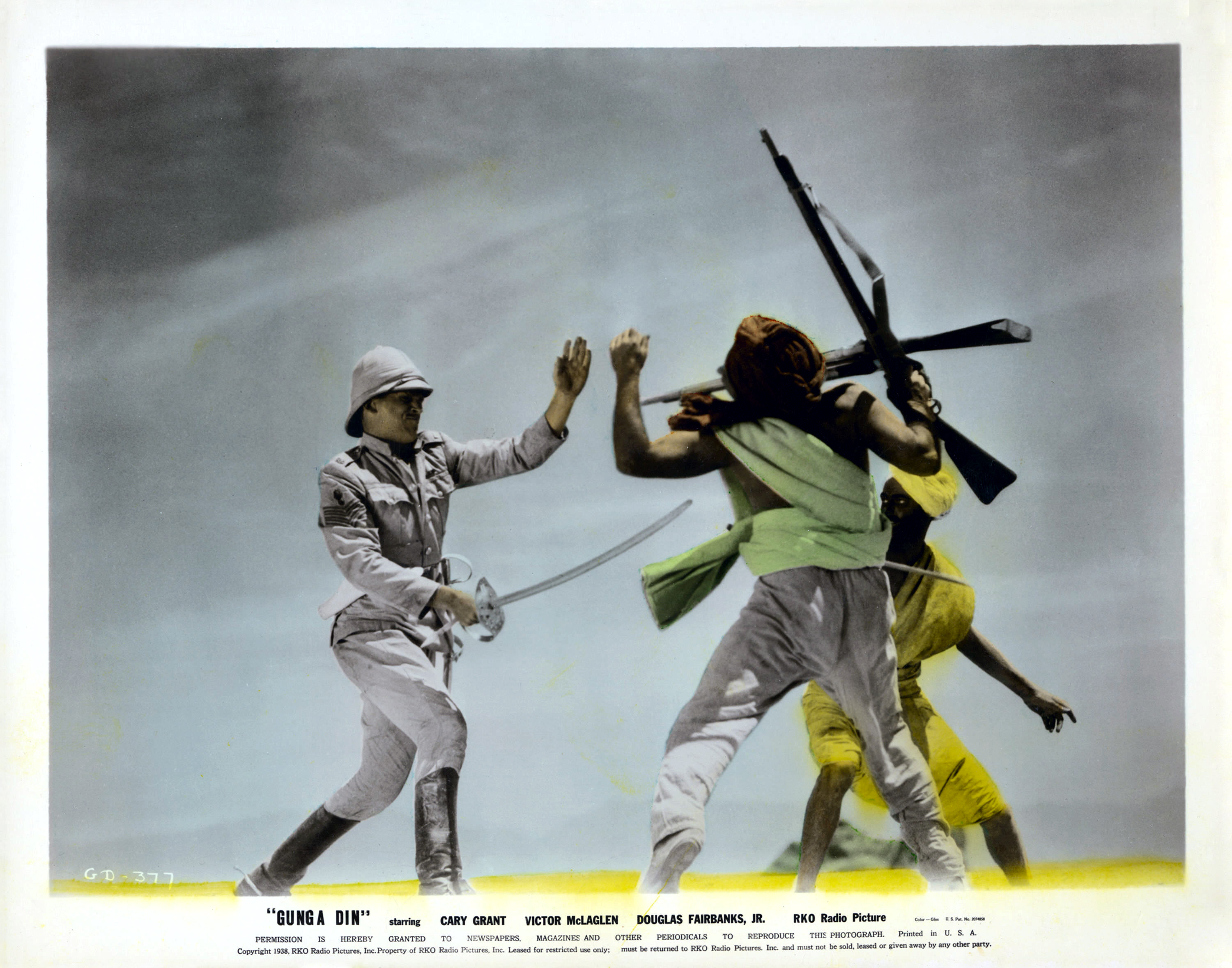
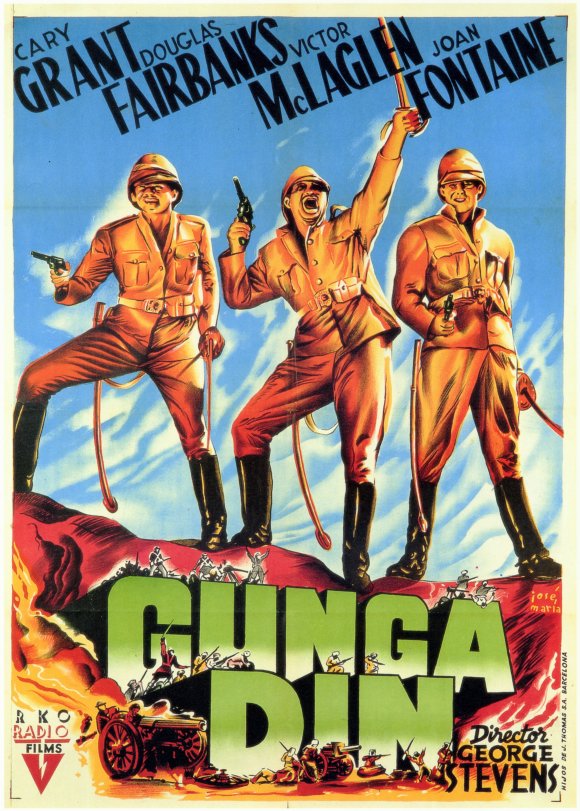
Other Hollywood Films Depicting India or the Middle East
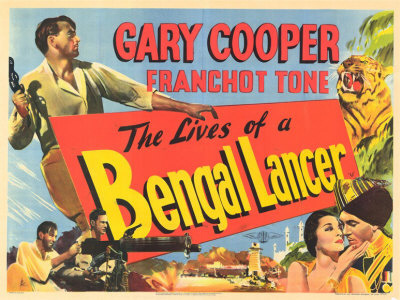
1935
|
|
|
1949
|
|
|
1951
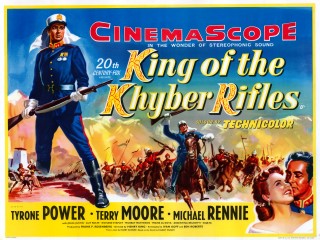
1953
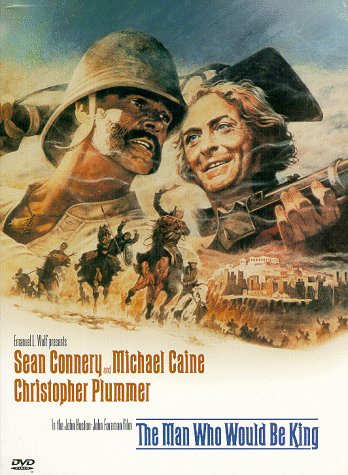
1975
|
|
|
1984

